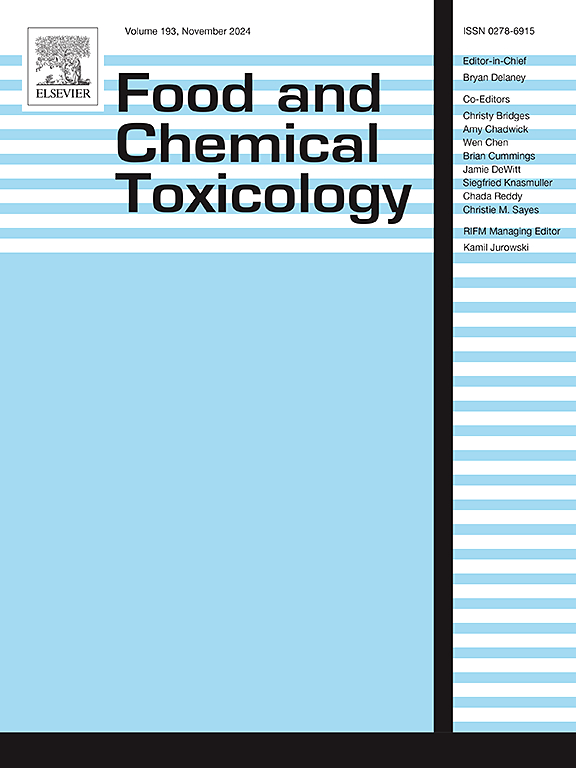Methyl donor ameliorates CCl4-induced liver fibrosis by inhibiting inflammation, and fibrosis through the downregulation of EGFR and DNMT-1 expression
IF 3.5
3区 医学
Q2 FOOD SCIENCE & TECHNOLOGY
引用次数: 0
Abstract
Methyl donors regulate the one-carbon metabolism and have significant potential to reduce oxidative stress and inflammation. Therefore, this study aims to investigate the protective effect of methyl donors against CCl4-induced liver fibrosis. Liver fibrosis was induced in male Sprague Dawley rats using CCl4 at a dose of 1 ml/kg (twice a week for a 4-week, via intraperitoneal route). Subsequently, methyl donor treatments were given orally for the next six weeks while continuing CCl4 administration. After 10 weeks, biochemical, histopathology, immunohistochemistry, western blotting, and qRT-PCR were performed. Methyl donor treatment significantly ameliorated ALT, AST, ALP levels, and oxidative stress associated with CCl4-induced liver injury. The histopathological investigation also demonstrated the hepatoprotective effect of methyl donors against CCl4-induced liver fibrosis, showing reduced tissue damage, collagen deposition, and attenuating the expression of the COL1A1 gene. Further, methyl donors inhibited the CCl4-induced increase in DNMT-1 and NF-κB p65 expression with an upregulation of AMPK. Methyl donor downregulated the CCl4-induced increase in inflammatory and fibrosis related gene expression and inhibited the apoptosis with a downregulation of EGFR expression. Here, we provide the first evidence that methyl donor combinations prevent liver fibrosis by attenuating oxidative stress, inflammation, and fibrosis through DNMT-1 and EGFR downregulation.

甲基供体通过抑制炎症改善ccl4诱导的肝纤维化,通过下调EGFR和DNMT-1表达改善纤维化。
甲基供体调节单碳代谢,具有显著的减少氧化应激和炎症的潜力。因此,本研究旨在探讨甲基供体对ccl4诱导的肝纤维化的保护作用。以1ml/kg剂量的CCl4(每周2次,连续4周,腹腔注射)诱导雄性Sprague Dawley大鼠肝纤维化。随后,在接下来的六周内给予甲基供体治疗,同时继续给予CCl4。10周后进行生化、组织病理学、免疫组化、western blotting、qRT-PCR检测。甲基供体治疗可显著改善ccl4诱导的肝损伤相关的ALT、AST、ALP水平和氧化应激。组织病理学研究也证实了甲基供体对ccl4诱导的肝纤维化具有肝保护作用,显示出组织损伤减少、胶原沉积减少、COL1A1基因表达减弱。此外,甲基供体通过上调AMPK抑制ccl4诱导的DNMT-1和NF-κB p65表达的增加。甲基供体下调ccl4诱导的炎症和纤维化相关基因表达的增加,通过下调EGFR表达抑制细胞凋亡。在这里,我们提供了第一个证据,甲基供体组合通过DNMT-1和EGFR下调来减轻氧化应激、炎症和纤维化,从而预防肝纤维化。
本文章由计算机程序翻译,如有差异,请以英文原文为准。
求助全文
约1分钟内获得全文
求助全文
来源期刊

Food and Chemical Toxicology
工程技术-毒理学
CiteScore
10.90
自引率
4.70%
发文量
651
审稿时长
31 days
期刊介绍:
Food and Chemical Toxicology (FCT), an internationally renowned journal, that publishes original research articles and reviews on toxic effects, in animals and humans, of natural or synthetic chemicals occurring in the human environment with particular emphasis on food, drugs, and chemicals, including agricultural and industrial safety, and consumer product safety. Areas such as safety evaluation of novel foods and ingredients, biotechnologically-derived products, and nanomaterials are included in the scope of the journal. FCT also encourages submission of papers on inter-relationships between nutrition and toxicology and on in vitro techniques, particularly those fostering the 3 Rs.
The principal aim of the journal is to publish high impact, scholarly work and to serve as a multidisciplinary forum for research in toxicology. Papers submitted will be judged on the basis of scientific originality and contribution to the field, quality and subject matter. Studies should address at least one of the following:
-Adverse physiological/biochemical, or pathological changes induced by specific defined substances
-New techniques for assessing potential toxicity, including molecular biology
-Mechanisms underlying toxic phenomena
-Toxicological examinations of specific chemicals or consumer products, both those showing adverse effects and those demonstrating safety, that meet current standards of scientific acceptability.
Authors must clearly and briefly identify what novel toxic effect (s) or toxic mechanism (s) of the chemical are being reported and what their significance is in the abstract. Furthermore, sufficient doses should be included in order to provide information on NOAEL/LOAEL values.
 求助内容:
求助内容: 应助结果提醒方式:
应助结果提醒方式:


